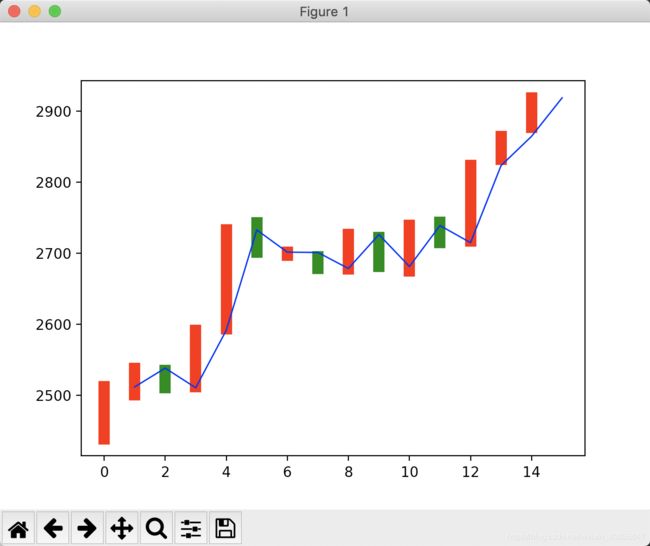Python Tensorflow 使用梯度下降法来预测股票价格
tensorflow 主要有三个层的使用
分别是 输入层 隐藏层 输出层
输入层: 主要是用来输入数据,设置数据,设置x and y
隐藏层: 使用w(权重)b(偏移量) 来度量数据的准确度,并且会随着训练次数的增多,从而降低误差,也会将w and b 的值设置得更加准确
输出层: 顾名思义,是训练结果数据的输出层
import numpy as np
import matplotlib.pyplot as plt
import tensorflow as tf
date = np.linspace(1,15,15)
endPrice = np.array([2511.90,2538.26,2510.68,2591.66,2732.98,2701.69,
2701.29,2678.67,2726.50,2681.50,2739.17,2715.07,
2823.58,2864.90,2919.08])
beginPrice = np.array([2438.71,2500.88,2534.95,2512.52,2594.04,2743.26,
2697.47,2695.24,2678.23,2722.13,2674.93,2744.13,
2717.46,2832.73,2877.40])
#数据的提取
print(date)
plt.figure()
#设置图形
for i in range(15): #15天的各天情况
dayOne = np.zeros([2]) #每天都要两种情况,开盘和收盘
dayOne[0] = i
dayOne[1] = i
price = np.zeros([2])
price[0] = endPrice[i]
price[1] = beginPrice[i]
if endPrice[i] > beginPrice[i]:
plt.plot(dayOne,price,'r',lw=8)
else:
plt.plot(dayOne,price,'g',lw=8)
# plt.show()
# A 输入层
dateNormal = np.zeros([15,1])
priceNormal = np.zeros([15,1])
for i in range(15):
dateNormal[i,0] = i/14.0
priceNormal[i,0] = endPrice[i]/3000.0
x = tf.placeholder(tf.float32,[None,1])
y = tf.placeholder(tf.float32,[None,1])
#B 隐藏层
w1 = tf.Variable(tf.random_uniform([1,10],0,1))
b1 = tf.Variable(tf.zeros([1,10]))
wb1 = tf.matmul(x,w1)+b1
layer1 = tf.nn.relu(wb1) #激励函数
#C 输出层
w2 = tf.Variable(tf.random_uniform([10,1],0,1))
b2 = tf.Variable(tf.zeros([15,1]))
wb2 = tf.matmul(layer1,w2)+b2
layer2 = tf.nn.relu(wb2)
#损失值 y是真实值 layer2 是计算值
loss = tf.reduce_mean(tf.square(y-layer2))
#梯度下降法来缩小loss的值
train_step = tf.train.GradientDescentOptimizer(0.1).minimize(loss)
with tf.Session() as sess:
sess.run(tf.global_variables_initializer())
for i in range(0,10001):
sess.run(train_step,feed_dict={x:dateNormal,y:priceNormal})
#w1 w2 b1 b1 A + wb --> layer2
pred = sess.run(layer2,feed_dict={x:dateNormal})
predPrice = np.zeros([15,1])
for i in range(0,15):
predPrice[i,0] = (pred*3000)[i,0]
plt.plot(date,predPrice,'b',lw=1)
plt.show()
运行结果
蓝色的线就是通过神经网络训练出来的
